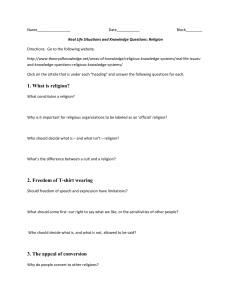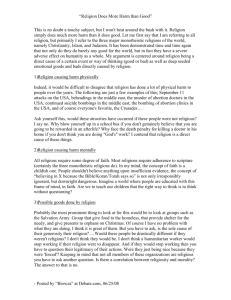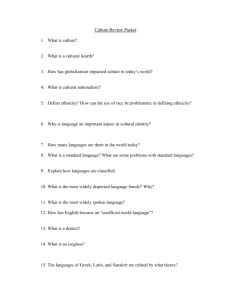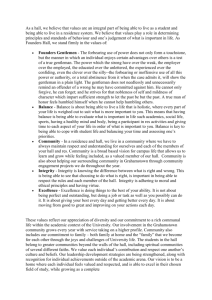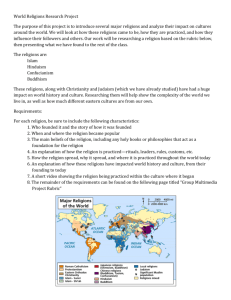13. Religious - Amm\dfs\Web Pages\guyberger.ru.ac.za\pixnbuttons
advertisement
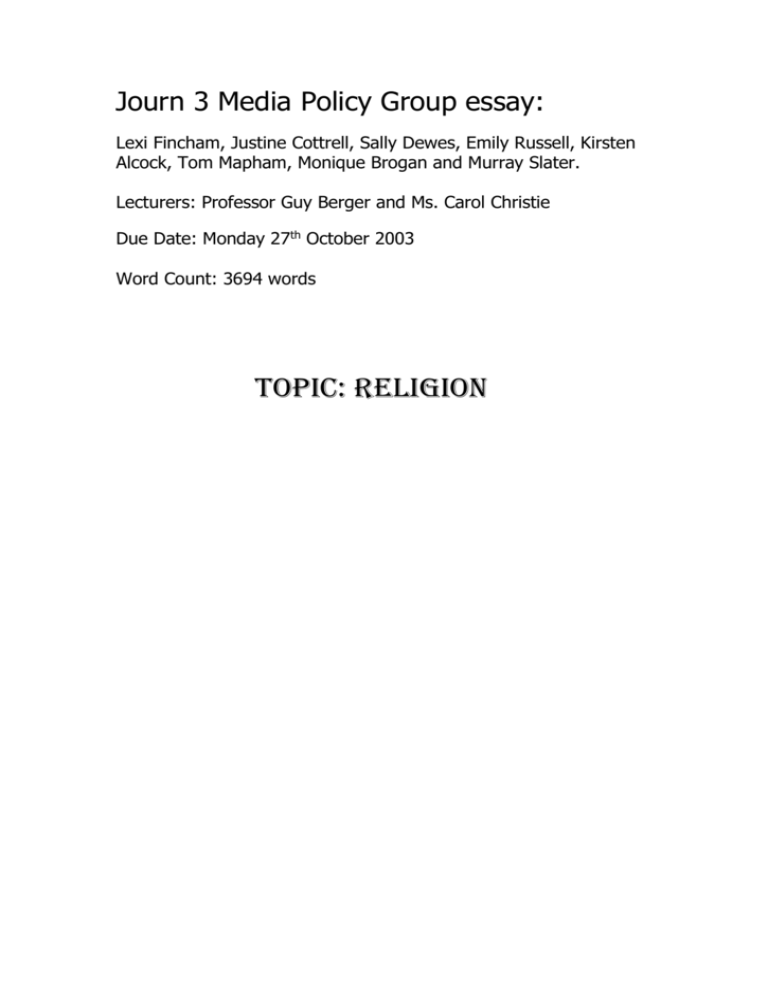
Journ 3 Media Policy Group essay: Lexi Fincham, Justine Cottrell, Sally Dewes, Emily Russell, Kirsten Alcock, Tom Mapham, Monique Brogan and Murray Slater. Lecturers: Professor Guy Berger and Ms. Carol Christie Due Date: Monday 27th October 2003 Word Count: 3694 words Topic: Religion Research Aims: The initial step involved in the investigation of a possible policy for Grocotts Mail’s coverage of religion, was the establishment of various research aims. Firstly decisions had to be made regarding the definition of the term ‘religion’, and what it would encompass. We thus defined religion as ‘an organised practice of worshiping the ‘divine’’. ‘Organised’ referring to the involvement of a group of people, and ‘divine’ meaning a greater being or force. Secondly, we aim to create a policy keeping in Grocotts Mail’s multi-cultural, multi-faith target audience in mind. This policy should propose the best methods by which Grocotts Mail could successfully allocate equal space and resources to all religious groups in Grahamstown (who have an interest in being covered). Finally we aim to objectively investigate the desired representation of both religious and non-religious members of the community. Our research should include an examination of various individual’s opinion on Grocotts Mail's previous coverage of their religion, as well as their hopes for future coverage. Methodology The methodology employed in the research of any particular area are dependant on the nature, aims and goals of the study itself, and may thus vary “from methods and techniques of sampling, to data-collection methods, to methods of data analysis’ (Babbi & Mouton, 2001:49). Research procedures can be divided into quantitative and qualitative techniques. “Quantitative, employing a variety of statistical analyses to make sense of data, where as qualitative techniques begin by identifying themes in the data and relationships between these themes’ (Blanche & Durrheim, 1999:47). In conducting research into the perceptions of various religious representatives, a qualitative approach is better suited to grasp the necessary subjective aspects involved. “Qualitative researchers attempt always to study human action from the insiders’ perspective” (Babbi & Mouton, 2001:53). The goal of such research is to understand and in some cases experience, as opposed to merely predict or explain. It is a non-numerical and flexible examination and analysis of observations, with the aim of determining underlying patterns, meanings and the significance of relationships. The role of the researcher is not of great importance, but it is the subject and their views that hold the most value (Babbi & Mouton, 2001: 271). 2 Thus in keeping with a qualitative approach, we conducted various in-depth interviews with important religious representatives, academics, non-religious individuals, students and general members of the community. In this manner we hoped to collect a broad base of perspectives from Grocotts Mail’s entire target audience. An interview was also conducted with Louise Vale, General manager of Grocotts Mail, with regards to the papers current policy on the coverage of religion. Interviews were structured around a few central questions, and then followed an open-ended format. In addition a focus group interview was conducted with the Trinity Presbyterian Student fellowship group, and in accordance with participant observation a free negotiation of answers and opinions was mediated by a member of our research team who is actively involved in the group (Babbi & Mouton, 2001:56). Contacts were also set up with the editors of nation wide newspapers via email and websites, regarding their coverage of religious information. Throughout all interviews an atmosphere of open and mutual trust was encouraged, with the exact motives behind the research being disclosed. After the collection of research findings an objective analysis of the responses and suggestions of each individual, or group was undertaken. Both personal comments and general trends were examined. This analysis of research findings was done ethically with no bias involved. Finally on the basis of this analysis a proposed policy on the coverage of religion was compiled. Summary of Findings Justine Cottrell interviewed Dr Julien Cobbing, head of the Rhodes University History department and an outspoken religious sceptic. Dr Cobbing explained that western society has up until recently projected Christian values imperialistically on to the world through the abuse of the mass media. He feels that the control of the Christian church is out-dated and that their influence has caused much conflict between less powerful and often less wealthy religious groups. Dr Cobbing expressed a view that the world in the modern day is multireligious and this in its embryonic stages of being recognised on the global playing field. This Dr Cobbing feels is a healthy move towards wider acceptance and harmony between people of all religious beliefs and backgrounds. He expressed that it is very important to remember that South Africa should not become a miniature America or miniature England. We are an African country with African problems that require African solutions. 3 In this way it was found that Dr Cobbing's views are very similar to those expressed in 1996 by former Gauteng Premier Tokyo Sexwale when speaking about the role of the South African media: "You are the South African media, writing about a South African story -- a changing story, a changing environment, and inevitably a changing media."(Steyn 1996:17) Localising his ideas Dr Cobbing revealed that there is a wide readership that Grocotts Mail caters to with varied views about religion. He expressed his view that it is important to note that all religions have a profoundly similar basis as far as ethics is concerned with the exception of a few values that are more often than not found outside the core beliefs. He suggests a more ecumenical policy that would involve making strong contacts with different religious groups and their leaders. Grocotts can take advantage of its community paper status and forge close ties with its community leaders. The strongest stories are often received in the form of friendly contact within an immediate environment. Once this is established it is possible to begin the process of building bridges between the various religions in the community. Dr Cobbing is fully aware of the power the media has and its importance in generating positive views on South Africa to its citizens. It is for this reason that he feels the need for Grocotts to provide a common meeting of ethics between religions. He says: "Religious members and their leaders should be focussing their efforts on drawing out the common grounds between them instead of highlighting the differences that they clearly do not share which causes conflict between them. The best way to do this is through the use of a community newspaper which has the power to link people together despite their differing religious backgrounds and beliefs." (14th October 2003) According to Dr Cobbing we should be making active moves away from creating a cultural hegemony that would mean the destruction of valuable cultural differences and the propagation of further rifts between religious groups. When asked to comment on the spectrum of denominations within Christianity and the combining of divine beliefs such as traditional African beliefs (such as praying to ancestors) and the Christian faith, Dr Cobbing stressed that it is for this very reason that he feels that binding religions through the recognition of common ethics is more valuable than emphasising the differences between them. In sum Dr Cobbing feels that the reporting of religious events and the coverage of various festivals should hold tolerance as the main aim. Reporters 4 should avoid dangerous trends and might look to recruiting the help of religious leaders and members of the community as writers. By providing them with space to write within guidelines of the policy we lay out further on in this essay, strong relationships will be forged and common ethics will be reported rather than stringent religious boundaries. Tom Mapham went to interview two members of the Buddhist community in Grahamstown, as well as a member of the African Traditionalist community: Based on interviews with JP Parkinson, head of the Zen Buddhist centre in Grahamstown, and James Lech, a practising Buddhist and BSc student at Rhodes, it appears that there is a need for more practical coverage of the religion within the Buddhist community in Grahamstown. Parkinson expressed a desire to see more useful information regarding Buddhist religious practices in community media like Grocotts Mail. He described such useful information as ranging from times of weekly meditation and yoga classes to dates of Buddhist retreats that take place every few months. Based on an interview with Ntosh Mazwi, a lecturer on Xhosa language and culture at Rhodes University, it appears that African Traditionalists take a similar view of religious coverage in Grocotts. Kirsten Alcock and Emily Russell interviewed the current Synagogue Administrator, Barach Vogel, who is also the ex-chairman of SAUJS-the Rhode's division of the South African Union of Jewish Students. Vogel explained that the Jewish community in Grahamstown is predominantly student oriented, as there exists only a handful of Grahamstown community members. The services at the Synagogue that are held during the Grahamstown National Arts Festival are usually comprised of approximately 50 people, which is its largest attendance. Barach expressed that the Jewish community generally 'keeps to itself”, however he feels that the coverage of the Jewish faith in Grocotts Mail will prevent the common misunderstandings that exist and create tolerance. This coverage should include the announcement of Jewish holidays, special celebrations and times of fasting. Barach feels that there is a lack of knowledge regarding the diverse religions that exist, for example, "most people do not even realise that the Jewish faith is comprised of different denominations". However, he does acknowledge that religion is a controversial issue that people tend to avoid, thus Grocotts can alleviate the problem by providing accurate and factual information regarding the Jewish faith. 5 Dr Motara, the current Mosque Administrator, and Ayesha Omar, the Muslim Student’s Association Media Officer, were interviewed as representatives of the Islam community. Dr Motara expressed a view that the provision of information would greatly help in enlightening the Grahamstown community at large about the misinformation and misrepresentation that is blurted out about Islam by CNN and the western Press in general. In addition, he feels that it would also help in creating a culture of Inter-Faith dialogue in Grahamstown. In congruence with Dr Motara’s view, Ayesha Omar feels that the Muslim faith is unfairly misrepresented in the media. She expressed her lack of appreciation for the way in which society tends to apply the morals and values pertaining to other religions, onto the Muslim faith. People do not understand the longstanding traditional practices inherent in the Quaran. A controversial issue such as stoning is one such example. Ayesha expressed a view that if people correctly understood these practices it would prevent the negative assumptions that are so prevalent within society about Muslims and the Muslim faith. She feels that Grocotts should include accurate information about this faith that will create understanding and tolerance among society, and a knowledgeable Muslim representative should verify this information. Sally Dewes went to interview a representative from Jehovah’s Witnesses: When interviewed about Grocotts Mail’s editorial policy on religion, Amanda Mushet, a student at Rhodes University and a member of Grahamstown’s Jehovah’s Witnesses congregation in York Street, had some insightful things to say. She could not make any comment about Grocotts current policy and treatment of her faith because she has never seen anything written about Jehovah’s Witnesses in the paper before. She said she has often seen the fact box that Grocotts prints at the end of the week containing information about the weekend’s services, but that her congregation’s meetings were never mentioned, only the various churches’. She also commented on the size of Grahamstown’s Jehovah’s Witnesses contingent. The Xhosa congregation of Kingdom Hall in York Street – about 70 people – is separate from the English/Afrikaans congregation – about 40 people. There is also another congregation in the township. 6 Murray Slater took upon the task of gathering opinions of persons deemed to have insight into the topic of religion. Open ended questions where put to various people through the medium of email. He approached a number of people with two replies forthcoming. Professor Peter Vale of the politics department and Mr Matthew Charlesworth were kind enough to reply. Their opinions were sought and given. Prof. Peter Vale’s input was welcomed as he is a strong follower of the Christian faith and specifically takes an interest in Church architecture. Mr Matthew Charlesworth runs a web site called ‘Catholic Corner’ and is a former Rhodes University Student Representative Council president. The questions that were posed by Murray Slater were open ended, and he asked specifically what the person thought Grocotts Mail’s policy on religion should be. The question was indeed broad with little direction and clarification was sought. Murray Slater then responded by asking specific questions in order to give the respondent focus in reply. Murray Slater asked questions that might be obvious but needed to be posed. Questions such as “ what religions should get space and at what proportion?” Mr Charlesworth responded by stating that Grocotts should not allocate “ x amount of space for religious news in Grahamstown.” He stated that the “fact that there are more Christians in Grahamstown than other religions justifies that there should be more space accorded to them”. He went on to say that religions should not be prejudiced against by not receiving space. Another focus question posed by Murray Slater was whether the religion of a reporter makes a difference in creating a story. Mr Charlesworth replied that it should not make a difference. If a reporter does not believe in a god (the Divine), the article written should report what an event means to the people in that religion. He added that an opinion column is viewed differently, as it is the writer’s specific expression of opinion and readers would be able to treat it differently. However the view should not offend other religions. Prof Vale agreed, as he stated that the paper should not be used for publishing inflammatory statements. Prof Vale also argued that faith based leaders should be encourage to contribute to the paper. Events, celebrations and good wishes for festivals or holidays should be accorded space. 7 Lexi Fincham went to go and speak to Earl Hodges, a leading member of the Christian society “His People” and former vice-president of the Rhodes University Students Representative Council. Hodges stated that in any journalistic viewpoint, the truth and facts are important. One cannot bring a religious viewpoint into a journalistic piece of work unless it is absolutely necessary. Hodges said that journalists need to be objective, not subjective. People must understand what happened through a piece of journalism, but this journalism should have a multifaceted, multi-voiced focus. He said that any media policy should have no religious bias whatsoever and that one can and must never forget that journalism involves telling the truth. “Be hard on the facts and soft on religion, and never blur religion and government” (10 October 2003) Earl concluded by saying that the state exists to administer justice on behalf of the people and religion is there to take care of the ‘heart issues’ of the people. Thus, a media policy should ideally protect any religion from being discriminated against, or from being portrayed in a stereotyped manner. Monique Brogan went to go and see Louise Vale, the new manager of Grocotts Mail, to establish what their previous policy on religion had been and to ask about their present aims for future coverage of religion: Louise said that there had been no previous policy on the coverage of religion and that they had relied on people bringing stories to them that limited their sources to those who were forthcoming. This was as a result of Grocotts limited resources as they had few staff and thus they did not have a great capacity to have complete coverage. However, she did say that with Grocotts Mail being a community newspaper, they realise that it is preferable to have greater participation from all aspects of the Grahamstown community. This enables greater participation by all in community life, and even, to some extent, in having a say and contributing to the democratic process. She encouraged an approach by Grocotts writers, both present and future, to mention and represent various viewpoints and said that the community can, and should, still be called upon to do this, especially considering the limited resources that would continue to be a part of the paper’s make-up. 8 She did say that the policy should encourage diversity of voices but at the same time some degree of unity among the different voices. Analysis of Findings and Suggested Religious Policy In our writing of this policy we aimed to fulfil the ten points of a sound and useful policy, they are: 1) Relevant and clear (This involves everything from the purpose in producing the policy through to the predictability and empowering nature of the policy) 2) Definition of what the policy covers 3) Who makes the policy and who adopts it 4) A list of inputs including external sources, the values we hold to be important in the creation of the policy, the research that we have done and its consultation 5) Describing whether this is a light-touch or heavy-handed policy as far as intervention is concerned 6) Practical implications concerning time and budget as well as practicality 7) Gauging degrees of success and/or failure once the policy has been made a living document and attitude 8) Description of who communicates the policy 9) Description of who will monitor the policy and the importance of this 10) Description of who will action changes should they be called for. The policy is designed to encompass all aspects of coverage regarding religion in the community-based newspaper Grocotts Mail. We considered news story style coverage of events as well as more feature related stories that might be of interest to the community of Grahamstown and in turn the readers of Grocotts Mail. Neither Parkinson nor Lech had any problem with misrepresentation in community media but both agreed that this was probably due to an almost complete lack of any coverage at all. While they do not claim that Buddhist religious practices warrant specific coverage in community media they both suggested that publishing the useful information described above would provide a practical service to readers A common view held by the representatives of both religions, is the acknowledgment of a lack of understanding about their particular religion. In addition it is felt that the coverage of religion in Grocott’s Mail in a factual, accurate format will contribute to increased tolerance and understanding. 9 Mushet was by no means accusatory in her comments, but from the insight she gave one can conclude that currently the paper is not representative of all religions and does not treat religious groupings with equality. This needs to be rectified in some way. There is also a large number of people who are not being targeted at all at the moment. Grocotts do not reach the township congregations it seems. It was agreed upon that religions news should be encouraged to provide education on various religions, thus dispelling “myths” and “legends” about religions. The paper is a community based paper and should seek to galvanise the community. The paper can do this by encouraging tolerance and understanding between religions. This can be done in respect of the multitude of religions in Grahamstown. The paper does not have a policy on religion but has in the past provided space for religious groups to advertise events for free. This informal policy should be incorporated into a formal policy with the overriding aim of representing the community it serves proportionately equally. We did realise as a group that Earl represents only one small side of Christianity as the Christian faith in itself is incredibly diverse and has much varying opinion. However, we did agree with Earl’s proposal that the media policy states that Religion should only be discussed in a piece of journalism if it is absolutely essential, and religious opinion or viewpoints must be strictly separated from the facts. Taking Louise’s views and aims for Grocotts into consideration, here are some of the recommendations we came up with: Though some may cite the limited resources of Grocotts as a sign that the policy aims may not be too extreme, we believe that with the increase of staff that will be working for the paper, in the form of Rhodes University students, there will much more of a scope for implementation of practical measures to ensure greater representation. Thus, the aims of the paper, as loosely laid down by Louise Vale in our interview with her, should be more firmly compiled into concrete aims and typed up and taught to staff, both present and future, and stuck up as guidelines for reporting around the Grocotts office. As far as including the whole community in making the paper and putting across their points of view, we believe that there should be space for religious leaders of the community to write a column on a religious issue of the week or simply explaining some of the finer points of their respective beliefs. 10 Weekly fact boxes about different events of different religions could also form a part of including a wider range of the community. As with some of the other people that we spoke to, Louise advocated a kind of unifying approach to representing different religions so as to promote cooperation rather than antagonism between them. This could be done by allowing all of them to have their say side-by-side with no lesser representation for any group and no hierarchical placing between the groups in representation. Also, even with religious leaders being able to put their side across, this would mean a greater understanding between the different groups and thus fewer problems created by mere fear or ignorance about the unknown. Conclusion: An editorial policy regarding religion should be in place to ensure that no religious group is discriminated against, that they are all represented accurately and equally and that they are all given a voice in a public forum. Religion is a touchy subject and needs to be treated carefully. it is not necessary to mention people's religion unless it is relevant and in covering a religious story, reporters should aim to write factually and accurately to promote understanding amongst the readers of other people's religions. 11 Reference List: Babbi, E. & Mouton, J. 2001. The Practice of Social Research. Cape Town: Oxford University Press Southern Africa Blanche, M.T. & Durrheim, K. 1999. Research in Practice. Cape Town: University of Cape Town Press (Pty) Ltd. Steyn, E. 2000. Mass Media towards the Millenium: the South African handbook of mass communication. De Beer, A.S. (ed.) Pretoria: van Schaik. 12
